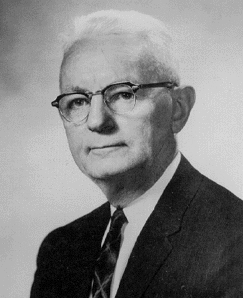Friends You Should Meet (1) — Cornelius Van Til


It’s not a secret that I love books. Here in my study I often feel like I’m surrounded by good friends. In this series of posts, I’d like to introduce you to some of my friends, both the old ones from centuries ago and the more recent ones. I’ll describe their strengths and, where necessary, their weaknesses. The aim is to help you find good friends for yourself — in other words, to find edifying reading that will give you a better understanding of the Christian faith.
So, let’s begin with one of my favourite authors, Cornelius Van Til. Van Til was born in the Netherlands in 1896. While still a child, he immigrated with his family to the United States. He grew up in the Christian Reformed Church and eventually went on to attend Calvin College and Seminary. In 1922, it was on to Princeton where he earned master’s degrees and a Ph.D. in 1927. He spent one year as the pastor of a CRC in Michigan before returning to Princeton as an instructor in apologetics. Later he became one of the pioneering faculty at Westminster Theological Seminary in Philadelphia. He taught apologetics there until 1973. He died in 1987.
Why is Van Til important? Van Til recognized the need for consistency in apologetics (the defense of the faith). Up till his day, there was no internally consistent system of Reformed apologetics. In other words, the apologetics that was taught and practiced up to that point was more consistent with Arminianism and Roman Catholicism than with Reformed theology. Van Til took the best insights of previous Reformed theologians including John Calvin, B. B. Warfield, Abraham Kuyper and (especially) Herman Bavinck, and brought them together into a consistent approach to defending and promoting the faith of the Scriptures.
Where do I start? If you want to read just one book by Van Til, it should be The Defense of the Faith. However, two caveats are in order: 1) Van Til is not always easy reading. He wrote for educated laymen and pastors/scholars; 2) If you are going to read The Defense of the Faith, I would suggest the third edition. There is a more recent fourth edition with notes by K. Scott Oliphint, but that edition tends to focus more on the differences that Van Til had with a number of his critics in the 1950s. If you’re looking for Van Til to put his beliefs about apologetics into practice, the only thing that’s available is his little booklet Why I Believe in God. If you want to read about Van Til’s life, the best biography is the one by John R. Muether, Cornelius Van Til: Reformed Apologist and Churchman. Finally, the best anthology and commentary on Van Til’s work is the massive Van Til’s Apologetic by Greg Bahnsen.
What to look out for? One might quibble with some of Van Til’s statements or formulations, but on the whole he is a reliable and consistently Reformed theologian. He had two formal faults, however. One was what I mentioned a moment ago: clear, effective communication was not his strong suit. The other is the fact that he so rarely provided the biblical foundations for the case he was making. It’s not that those biblical foundations weren’t there, but he just didn’t make them obvious. That would fall to later generations of his students and followers.
I do not exaggerate when I say that I learned to love the Reformed faith because of Cornelius Van Til. As a university student I read The Defense of the Faith and I caught Van Til’s infectious love for being Reformed. Moreover, I realized that our theology, because it is biblical, has the resources within to be able to withstand any assault the world can mount.


